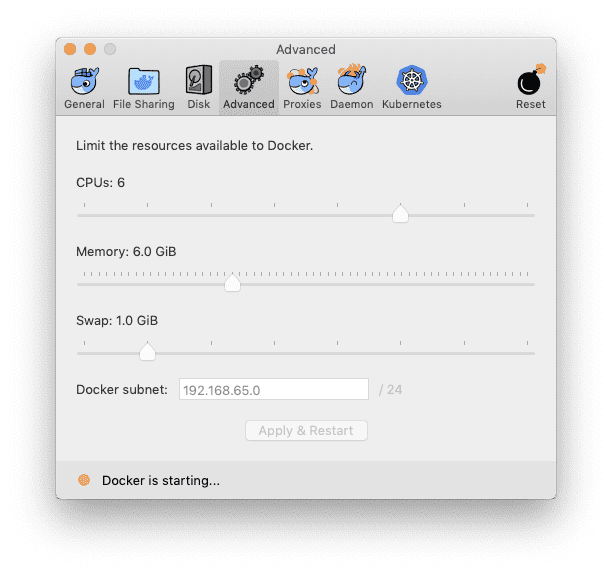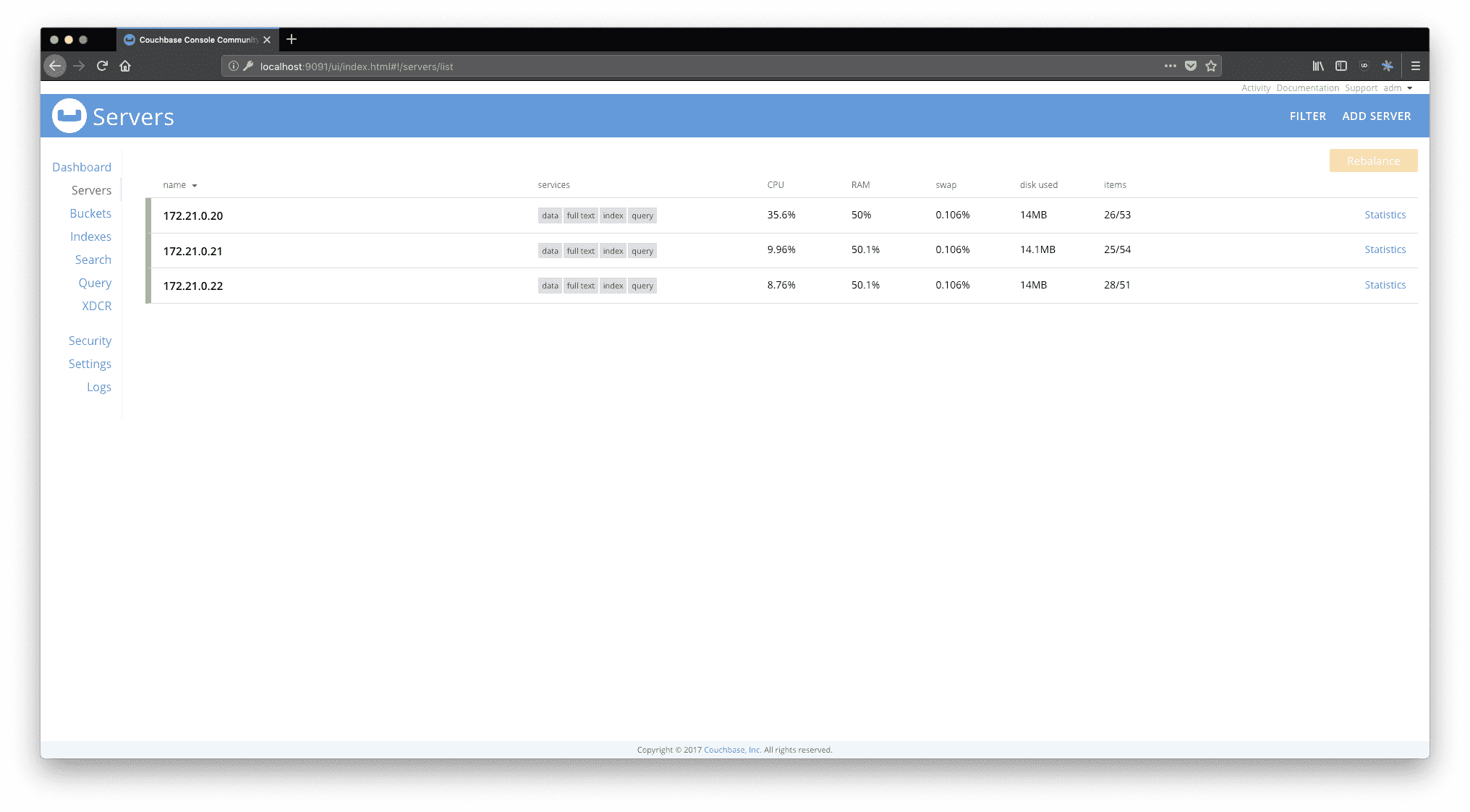I have an old Couchbase 4.5.x cluster, and I though it would be nice to upgrade it. This are my notes and the tests I did before doing it “in production”™️.
Breaking changes
First thing I did was going through the changelogs and look for breaking changes.
Turns out there is only one: MB-18042 FTS UI: Remove Byte Array Converter from UI - Couchbase.
Since I don’t use the feature, not a problem, yay! 🚀
The last community version available at the time of writing is 5.1, so we will use that one!
Procedure
As per documentation,
we have several options. XDCR was my first idea, but on a big cluster it may
not work properly (at least on Couchbase 4.5.x). Graceful failover and
delta recovery seemed too “manual” for me, as I didn’t want to manually upgrade
existing instances.
That leaves us with with the Swap Rebalance option.
Swap rebalance
Swap rebalance is an automatic kind of rebalance that Couchbase does. It happens when you are adding and removing the same amount of nodes and do a rebalance.
If that happens, Couchbase will copy the vBuckets from one node being removed to one node being added, which is faster that what it usually does.
If a swap rebalance fails or is stopped for whatever reason, you can rebalance again, but it will not be a swap rebalance anymore and thus will take more time.
Testing it with Docker
We can try this out in a test cluster using Docker! Create a
docker-compose.yaml file like the following:
version: '2'
services:
cb1:
image: couchbase/server:community-4.5.0
networks:
cbnet:
ipv4_address: 172.21.0.10
ports:
- 8091:8091
cb2:
image: couchbase/server:community-4.5.0
networks:
cbnet:
ipv4_address: 172.21.0.11
cb3:
image: couchbase/server:community-4.5.0
networks:
cbnet:
ipv4_address: 172.21.0.12
cb4:
image: couchbase/server:community-5.1.1
networks:
cbnet:
ipv4_address: 172.21.0.20
ports:
- 9091:8091
cb5:
image: couchbase/server:community-5.1.1
networks:
cbnet:
ipv4_address: 172.21.0.21
cb6:
image: couchbase/server:community-5.1.1
networks:
cbnet:
ipv4_address: 172.21.0.22
networks:
cbnet:
driver: bridge
ipam:
config:
- subnet: 172.21.0.0/16
gateway: 172.21.0.1
If you are using Docker 4 Mac, I recommend increasing the CPU limits:

Docker for Mac settings.
Once that’s done, fire the machines up:
docker-compose up
docker-compose up
Initialize the Couchbase 4.5.x cluster:
docker exec cb_cb1_1 couchbase-cli cluster-init \
--cluster-username=adm \
--cluster-password=secret \
--cluster-port=SAME \
--cluster-ramsize=256 \
--cluster-index-ramsize=256 \
--services=data,index,query,fts
Add the other nodes and rebalance:
docker exec cb_cb1_1 couchbase-cli rebalance \
-c localhost -u adm -p secret \
--server-add=172.21.0.11 \
--server-add=172.21.0.12 \
--server-add-username=adm \
--server-add-password=secret \
--services=data,index,query,fts
docker exec cb_cb1_1 couchbase-cli server-list \
-c localhost -u adm -p secret
Create a bucket and insert some data:
docker exec cb_cb1_1 couchbase-cli bucket-create \
-c localhost -u adm -p secret \
--bucket=customer \
--bucket-ramsize=100 \
--enable-index-replica=1 \
--bucket-replica=2
for i in `seq 1 100`; do
echo "inserting $i"
docker exec cb_cb1_1 cbq --quiet=true -output=/dev/null \
-u adm -p secret -engine=http://127.0.0.1:8091/ \
--script="INSERT INTO customer (KEY, VALUE) VALUES (\"$i\", { \"id\": $i, \"name\": \"John Doe -$i\"})"
done
You can confirm everything by going to the Couchbase Console.
Swap rebalance 1 node
Let’s do a single node swap rebalance first to see what happens:
docker exec cb_cb1_1 couchbase-cli rebalance \
-c localhost -u adm -p secret \
--server-remove=172.21.0.12 \
--server-add=172.21.0.20 \
--server-add-username=adm \
--server-add-password=secret \
--services=data,index,query,fts
You can see your cluster using the new Couchbase 5 interface by going to its Couchbase Console.
Compatibility mode
Since the cluster has nodes with version 4.5.x and 5.1.x,
it will run in “4.5 compatibility mode”, which is OK:

Cluster compatibility mode.
While in that mode, we can add and remove nodes from both versions. Once all nodes are on Couchbase 5.1, you can’t add old version nodes anymore.
Swap rebalance all other nodes
Let’s finish the upgrade by swap rebalancing the last nodes:
docker exec cb_cb4_1 couchbase-cli server-add \
-c localhost -u adm -p secret \
--server-add=172.21.0.21 \
--server-add-username=adm \
--server-add-password=secret \
--services=data,index,query,fts
docker exec cb_cb4_1 couchbase-cli server-add \
-c localhost -u adm -p secret \
--server-add=172.21.0.22 \
--server-add-username=adm \
--server-add-password=secret \
--services=data,index,query,fts
docker exec cb_cb4_1 couchbase-cli rebalance \
-c localhost -u adm -p secret \
--server-remove=172.21.0.10 \
--server-remove=172.21.0.11
Once the rebalance is over, we should have a full 5.1 Couchbase cluster - without any downtimes!
The compatibility warning should go away as well:

Couchbase web interface.
Cleanup
Kill all containers and remove them.
docker-compose kill
yes | docker-compose rm
How about production
Well, the general idea is the same:
- add a few Couchbase 5 nodes;
- remove a few Couchbase 4 nodes;
- rebalance;
- rince and repeat;
It will take some time, sure, but there are a lot of improvements. The ones I’m more interested on are related to XDCR, which seems to have a received a lot of improvements!
